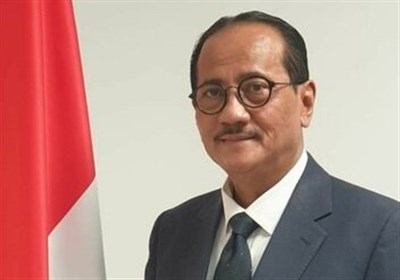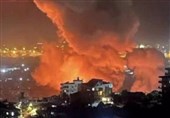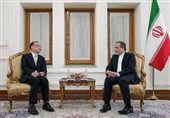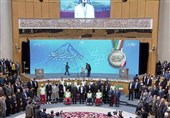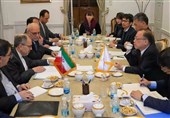Indonesia Stresses Stronger Iran Ties As Trade, Energy Cooperation Grows
TEHRAN (Tasnim) – Indonesia's Ambassador to Iran Ronny Prasetyo Yuliantoro reaffirmed Jakarta’s commitment to strengthening ties with Tehran across trade, energy, and healthcare, while firmly rejecting claims of normalization with Israel and reiterating unwavering support for Palestine.
In a recent interview with Tasnim News Agency, Ronny Prasetyo Yuliantoro emphasized his country’s commitment to expanding bilateral relations with Iran in trade, energy, and healthcare while reaffirming unwavering support for Palestine and addressing geopolitical tensions in West Asia.
Indonesia’s Ambassador highlighted that the 75th anniversary of diplomatic ties between Iran and Indonesia marks a significant milestone coinciding with new administrations in both countries.
He expressed Indonesia’s intent to use “all diplomatic means necessary” to deepen cooperation across various fields.
The following is the full text of his exclusive interview with Tasnim:
Bilateral Relations and Cooperation
Tasnim: On November 9, we marked the 75th anniversary of diplomatic relations between Iran and Indonesia. In an article for the occasion, Iran’s Foreign Minister emphasized that this milestone is significant, particularly as both countries’ new governments have recently taken office. How does Indonesia's new government view this milestone, and what plans does it have for relations with Iran?
Ambassador: For the 75th anniversary of bilateral relations in 2025 — not in October 2024, we see that it coincides with new administrations in respective countries, and it offers fresh outlook towards each other and the region.
We have learned about President Pezeshkian's intention to expand friendly ties and also the statement to deepen relations between Iran and Indonesia.
While we also see Iran as a significant player in the region that we need to engage in order to create a peaceful and stable region.
As for the plans, given the wide scope of cooperation, we will pursue all diplomatic means necessary to advance Indonesia and Iran relations in various areas of engagement.
Tasnim: Last year, the late Iranian President Ebrahim Raisi visited Indonesia and signed economic and trade agreements, setting a target to increase bilateral trade to $20 billion. What steps have been taken toward achieving this goal so far?
Ambassador: Indonesia and Iran have already signed the Preferential Trade Agreement (PTA) to bolster trade ties between the two countries.
Both countries will lower tariffs on imports and exports of certain goods.
Iran will reduce tariffs on imported Indonesian products, such as textiles, pharmaceuticals, processed food, tea, coffee, and palm oil.
Meanwhile, Indonesia will provide easier market access to certain Iranian goods, such as some dairy products, metals, oil, and chemical items.
Both sides have also sent business delegations to explore trade cooperation since the visit of the late President Raisi.
Tasnim: President Raisi, accompanied by Iran's Oil Minister, visited Indonesia with one of the key focuses being increased energy cooperation between the two countries. What is the current level of energy exchange between Iran and Indonesia, and did last year’s visit lead to any concrete outcomes in this area?
Ambassador: For cooperation in the energy sector, both countries agreed to explore any possibilities of mutual cooperation in the fields of oil, gas, refining, and petrochemical industry.
For now, there are cooperations in the field of capacity building.
Tasnim: During the late President Raisi’s visit to Jakarta, agreements were signed for medical and healthcare cooperation, including a plan to equip 12 Indonesian hospitals with Iranian medical equipment. What progress has been made in this regard, and what are the latest updates on medical and healthcare collaboration?
Ambassador: In the health sector, we have very strong and significant cooperation.
Currently, there are four robotic telesurgery centres in general hospitals spread across four provinces in Indonesia.
The hospitals have installed the necessary hardware and software and are conducting robotic telesurgery training with experts who come directly from Iran.
Tasnim: Following the Iran-Indonesia trade agreements, the United States reacted with interventionist rhetoric, with a US State Department spokesperson threatening sanctions on countries engaging with Iran. Has Indonesia continued its trade relations with Iran despite US interventionist policies?
Ambassador: Based on our foreign policy, Indonesia will not recognize unilateral sanctions imposed by any individual country.
Indonesia only recognizes international sanctions under UN regulations.
Indonesia will continue to strive to increase economic cooperation with Iran despite unilateral sanctions.
Tasnim: One of the proposals for strengthening people-to-people connections between the two countries is establishing direct flights between Tehran and Jakarta. Has any timeline been set for this initiative, and can we expect to see it realized soon?
Ambassador: We have conducted talks between Ministries during the late President Raisi's visit last year, and we have also done talks between Embassy and representatives from the Ministry of Tourism of Iran as well as the airlines.
I am hopeful and confident that both of our countries will find satisfying solution on the issue in the foreseeable future.
Regional and Global Developments
Tasnim: Indonesia has a long history of supporting Palestinian independence. Since its independence in 1945, Indonesia has consistently supported Palestine in international conferences. Over the past year, we have seen continued support from Indonesia, including widespread protests by Indonesian people condemning Israeli atrocities. Is this support purely political?
Ambassador: We have, and will continue to support Palestine in the international fora.
Media may think that it is political, but we believe it is a principled and just position to stand on.
Make no mistake about it, we do politically support Palestine, but we have also sent multiple humanitarian aid packages to Palestine, we built Indonesian hospital in the Gaza Strip, and we have also sent our medical professionals to treat the casualties in Palestine.
We do actual actions that help the people of Palestine and to say that our support is "merely political" would be misleading and insulting.
Tasnim: Claims were previously made regarding Indonesia normalizing ties with Israel in exchange for membership in the Organization for Economic Cooperation and Development (OECD). These claims were met with firm denials from Indonesian officials. Why do you think such claims are being made against Indonesia?
Ambassador: Indonesian MOFA had released statement to shed a light on this issue.
We have no plan to establish normalization with Israel, especially after their continuous actions in Gaza and Lebanon.
If there are claims about that made against us then you have to ask the media who reported this false information, but we believe it was just a case of the nature of some media outlets to sensationalize or spread false information without checking relevant sources.
Tasnim: In recent months, the Zionist regime has escalated tensions in the region and expanded its acts of aggression, as seen in its attack on Iranian territory. Indonesia condemned Israel’s criminal actions. In your view, what is the purpose behind Israel’s crimes and its efforts to intensify tensions in the West Asia region?
Ambassador: Irrespective of their intention, Israel's actions are not justifiable, full stop.
These actions only exacerbate the situation on the ground and kill innocent people.
If they are concerned about their own security, then it is rooted in their illegal occupation of Palestinian territories — and the fact of the matter is, it is not just Indonesia who unilaterally says it is illegal, even the ICJ and and UNHRC have stated the exact same thing.
Tasnim: How can Iran and Indonesia cooperate to contribute to strengthening a balanced global order?
Ambassador: We have to be able to push for dialogue and cooperation, and the way to be effective in doing so would be threefold:
Firstly, we need to make ourselves believe that we are honest and trustworthy partner to engage with.
Secondly, we need to be able to make countries with differences to be able to talk and sort them out — we have done for example in ASEAN through East Asia Summit, where countries with differences all have a seat at the table and foster dialogue and cooperation. When diplomacy fails, war starts. So diplomacy must be at the forefront of foreign policy.
Thirdly, we cannot have a world where there is heavy dependency from one country to another.
Mutual interdependence in many layers — political-security, socioeconomic, and cultural aspects would be what helps to create a more balanced world order.
Economy and Energy
Tasnim: Indonesia ranks 22nd among the world’s oil producers, yet it imports part of its oil requirements. Does Indonesia have plans to increase investment and develop its oil and gas fields? Is the Indonesian government considering utilizing the capabilities of skilled Iranian companies in this sector?
Ambassador: Based on our data, Indonesia's potential resources are 10 times the proven reserves, so we still have the potential as a big player in the industry.
As for our position on investment, we are doing it with our own SOE — Pertamina, and we are open to any foreign investor in the field of oil and gas.
The Indonesian government also provides attractive regulations, such as by providing a share split starting from 80-20. Along with the increasing risk determined by geological and geophysical experts, the government's share will decrease where for natural gas it can be 50-50, and for oil 5545.
We understand the capabilities of Iranian companies, and Indonesia is open to cooperation as long as it is in line with our national interests.
Tasnim: Around seven years ago, Indonesian officials visited Iran and explored its electricity sector, including discussions on utilizing MAPNA Group’s capabilities to develop Indonesia’s power infrastructure. Has Indonesia so far used the capacity of Iranian companies in its power sector? What is the current state of power supply in Indonesia, and are there any agreements with Iran to develop this capacity further?
Ambassador: Electricity supply in Indonesia is quite different based on the region.
While on cooperation with MAPNA, according to our note, our project with MAPNA is already commissioned in Belawan, and it was on gas unit for power plant in Indonesia.
We are certainly open for further possible cooperation with Iranian companies in the future on electricity supply.
We think given the ever-increasing demand of electricity, which may also further be pushed by Electric Vehicles (EVs), then cooperation on this sector is certainly very strategic.

